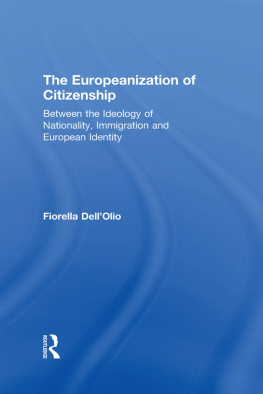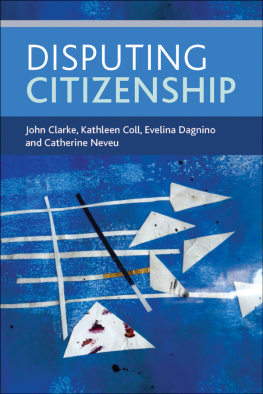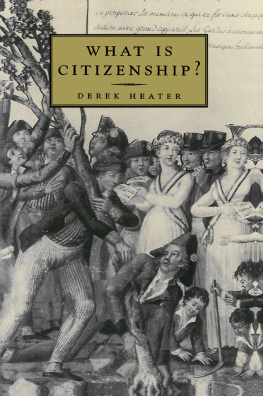AT THE EDGES OF CITIZENSHIP
At the Edges of Citizenship is a vivid and incisive ethnography that powerfully exposes the incoherent margins of the partition between citizen and on-citizen. Foregrounding the instabilities between these juridical statuses and the paradoxical constructions of insiders and outsiders, Kate Hepworth reveals the complexity and contradictions of discrepant experiences of migrant illegality and deportability in Italy alongside the vulnerability of Europes most marginalized citizens to forcible eviction and deportation. This remarkably creative and insightful study is as subtle as a work of social theory as it is unforgettable as a sensitive depiction of the lived conditions of intimate foreigners, respectable illegals, and abject citizens.
Nicholas De Genova, Kings College London, UK
In this important book, Hepworth paints a lively ethnographic portrait of sites occupied by migrant, non-citizen, nomad. Her canvas is the contemporary urban Italian landscape where migrant workers live out securitization and exclusion and survive, reconfiguring meanings and practices of citizenship. Hepworth understands the complexity of human relations and the depth and uncertainty required for meaningful social analysis.
Alison Mountz, Wilfrid Laurier University, Canada
This is an impressive book that breaks new ground both theoretically and empirically. In it, Hepworth enables us to see citizenship in a new way by approaching citizenship in relation to its alterity that is, those figures of excess that citizenship both embraces and repels in order to reproduce itself. What emerges is a complex terrain of struggle whereby citizen and non-citizen alike are transformed by their encounters, enabling us to witness processes of control and exclusion but also moments of solidarity and welcoming. The book will make a significant impression on the field of critical citizenship studies.
Peter Nyers, McMaster University, Canada
At the Edges of Citizenship
Security and the Constitution of Non-citizen Subjects
KATE HEPWORTH
University of Technology, Sydney, Australia
First published 2015 by Ashgate Publishing
Published 2016 by Routledge
2 Park Square, Milton Park, Abingdon, Oxon OX14 4RN
711 Third Avenue, New York, NY 10017, USA
Routledge is an imprint of the Taylor & Francis Group, an informa business
Copyright Kate Hepworth 2015
Kate Hepworth has asserted her right under the Copyright, Designs and Patents Act, 1988, to be identified as the author of this work.
All rights reserved. No part of this book may be reprinted or reproduced or utilised in any form or by any electronic, mechanical, or other means, now known or hereafter invented, including photocopying and recording, or in any information storage or retrieval system, without permission in writing from the publishers.
Notice:
Product or corporate names may be trademarks or registered trademarks, and are used only for identification and explanation without intent to infringe.
British Library Cataloguing in Publication Data
A catalogue record for this book is available from the British Library
Library of Congress Cataloging-in-Publication Data
Hepworth, Kate.
At the edges of citizenship : security and the constitution of non-citizen subjects / by Kate Hepworth.
pages cm
Includes bibliographical references and index.
ISBN 978-1-4724-3036-6 (hardback : alk. paper) ISBN 978-1-3155-6824-9 (ebook) ISBN 978-1-3171-7760-9 (epub)
1. Citizenship. 2. Aliens. 3. Marginality, Social.
I. Title.
JF801.H46 2015
ISBN 9781472430366 (hbk)
ISBN 9781315568249 (ebk-PDF)
ISBN 9781317177609 (ebk-ePUB)
Contents
Acknowledgements
This research was undertaken with the support and involvement of many people. First and foremost, to the individuals who participated in the research, who gave up their time to be interviewed and in many cases let me into their lives. I would also like to acknowledge the support given to me by the volunteers from Naga Onlus, in particular Saveria, Marta, Marzia, and Lavinia. Not only did they facilitate my access to informal settlements around Milan and painstakingly explain the histories of the settlements and the city, they also provided me with friendship.
To the mentors who have provided support throughout the development of the research: Ilaria Vanni, Catherine Robinson, Virginia Watson and Tommaso Vitale. To Nando Sigona, Alessandro Simoni, Nicholas de Genova, Alison Mountz, Peter Nyers, Olivia Hamilton, Scott East, and Kylie Sait for their careful reflections on earlier versions of the texts that eventually became this book.
The ideas in this book have been influenced by conversations and debates with a number of friends and colleagues: Sumugan Sivanesan, Damian Spruce, Shane Reside, Eve Vincent, Michele Lancione, Aly Crosby, Gaia Giuliani, Antonella Biscaro, Ned Rossiter, Brett Neilson. And to the dear friends who have distracted me over the years, cooked me endless dinners and sent me on new and wonderful tangents: Jessie, Emma, Victoria, Alessandro, Zehra, Deborah. To my family Julia, Maria, John, as well as to the nonni and zii who travelled here so that I could go back there. And to Dan, who proved that timing is everything.
Introduction
In March of 2008, posters appeared throughout Milan depicting a hand drawn image of an American Indian in full headdress emblazoned with the words: they suffered immigration, now they live on reservations. Part of the national campaign for the Lega Nord (Northern League), a party that would come to power in April as part of Berlusconis winning coalition, the poster was less a statement of policy than a polemical vision of an imagined future in which Italians had conceded sovereignty and were forced to live in restricted and controlled areas of their own territory. This poster operated within a national election campaign that was fought by both major coalitions on issues of security, migration, and European integration. This campaign continually invoked images of a country under siege from an influx of illegitimate outsiders: clandestini (illegal immigrants), who circumvented border controls to enter the nation, and nomads from new European Union member-states, for whom it was said the border no longer existed. In the language of these campaigns, the outsiders were already inside the nation, and they were also waiting at its borders.
These illegitimate outsiders became the primary target of legislation announced shortly after the election. On the 10th May 2008, only two days after being sworn into parliament, the Italian Minister for the Interior Roberto Maroni announced a series of temporary and permanent legislative measures collectively referred to as the Security Package. These measures addressed a continuum of threats and sources of insecurity, including urban degradation, road safety, illicit drugs, organised crime, and illegal migration. This expansive range of sources of insecurity was extended to include nomads through a second set of decrees that declared a state of emergency with regards to settlements of nomad communities in the regions of Campania, Lazio and Lombardy. This nomad emergency joined a second state of emergency regarding the persistent and exceptional influx of extra community citizens that had been in place in three Italian regions since 2002, and which was extended to the entire national territory in July 2008.













